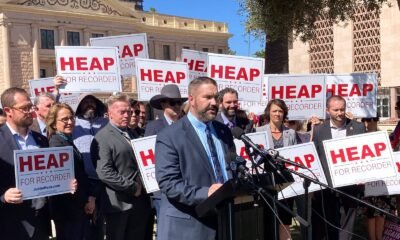2024 election
Disruptions in Arizona Counties Certifying Primary Election Foreshadow November Chaos

The tension was palpable during a Pinal County supervisors meeting on Monday as Chairman Mike Goodman struck his gavel repeatedly in an attempt to restore order. Republican Supervisor Kevin Cavanaugh, despite Goodman’s efforts to silence him, pushed forward with unsubstantiated allegations of cheating in the county’s primary election.
Cavanaugh, who had recently lost the sheriff’s race, insisted on airing his views: “Five other candidates have expressed that very strange levels of —.” Goodman’s frustration grew, leading him to request, “Can you turn off his mic?”
Voting on Arizona’s July 30 primary went off without major hitches statewide, according to representatives from both political parties. However, Pinal County was not immune to disruptions as supervisors convened to certify the election results. Cavanaugh cast his vote with a reluctant “aye under duress,” claiming he felt compelled to comply despite his belief that the results were incorrect, including his significant loss in the sheriff’s contest.
Maricopa County likewise experienced discord; residents voiced their concerns loudly during public comments, with one individual stating she trusted Russian elections more than those in Maricopa, calling it a “joke.” Ultimately, both counties saw their Republican-led boards unanimously vote to certify results, but unrest may foreshadow future challenges.
The atmosphere at these meetings raises questions about what lies ahead in November. If high-profile figures like Donald Trump and Kari Lake experience losses in upcoming elections, they could reignite claims of election fraud. The stakes are high, as some supporters may feel motivated to protest the outcomes aggressively, even invoking votes “under duress.”
After the Pinal meeting, Republican County Attorney Kent Volkmer expressed concern over Cavanaugh’s “under duress” vote, suggesting it could warrant a revote if it had been decisive. “Duress means it’s not a vote of your own accord,” he noted.
Cavanaugh’s claims have led him to file a complaint with the Arizona Attorney General’s Office, alleging election irregularities in his race against Ross Teeple for sheriff. Data analysts, however, have found no substantial evidence to support his concerns, reiterating that both major political parties believe the election results reflect an accurate count.
Legal obligations dictated the supervisors’ discussion; under state law, they are required to certify results by a specific deadline unless there are missing results, which was not the case. Volkmer clarified the nature of the certification process, stating, “It’s not the board saying we support, we believe this is correct.”
This is not the first instance of a supervisor voting “under duress.” A similar situation occurred in Mohave County during the November 2022 elections. There, Republican supervisors reported similar threats of prosecution for not voting in favor of certification. Attorney General Kris Mayes is currently investigating a separate situation in Cochise County related to delayed certification.
After the vote in Pinal County, Supervisor Stephen Miller characterized the proceedings as a “clown show” and expressed regret over the unproductive dialogue. Cavanaugh’s interruptions highlighted the discord’s depth, prompting Miller to suggest adjourning the meeting. Goodman, however, swiftly closed the session without further elaboration.
Observations from the public attendance reinforced mixed sentiments about the election’s integrity. Kirk Fiehler, vice chair of the Pinal County Republican Committee, expressed confidence in the process based on his observations, while Pinal County Democrats’ Chair Lisa Sanor reflected similar sentiments, emphasizing the importance of trust in the electoral process amidst the backdrop of Cavanaugh’s allegations.
In Maricopa County, election officials Scott Jarrett and Rey Valenzuela attempted to dispel doubt by outlining the election’s protocols and bipartisan support. Despite this, interruptions and hostility marred their presentation. As the supervisors prepared to vote on the results, they faced heckling and derision from the audience, which has become the norm during recent meetings.
Supervisor Thomas Galvin defended the integrity of the electoral process, noting that the overwhelming number of ballots cast showcased public confidence. Following the unanimous vote to certify, a woman attempted to voice her dissent, but the meeting adjourned swiftly, leaving lingering questions about election integrity amidst fervent disputes.


















